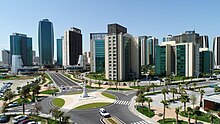Portal:Business
The Business and Economics Portal Business is the practice of making one's living or making money by producing or buying and selling products (such as goods and services). It is also "any activity or enterprise entered into for profit." A business entity is not necessarily separate from the owner and the creditors can hold the owner liable for debts the business has acquired. The taxation system for businesses is different from that of the corporates. A business structure does not allow for corporate tax rates. The proprietor is personally taxed on all income from the business. A distinction is made in law and public offices between the term business and a company such as a corporation or cooperative. Colloquially, the terms are used interchangeably. (Full article...) Economics (/ˌɛkəˈnɒmɪks, ˌiːkə-/) is a social science that studies the production, distribution, and consumption of goods and services. Economics focuses on the behaviour and interactions of economic agents and how economies work. Microeconomics analyses what is viewed as basic elements in the economy, including individual agents and markets, their interactions, and the outcomes of interactions. Individual agents may include, for example, households, firms, buyers, and sellers. Macroeconomics analyses the economy as a system where production, distribution, consumption, savings, and investment expenditure interact, and factors affecting it: factors of production, such as labour, capital, land, and enterprise, inflation, economic growth, and public policies that have impact on these elements. (Full article...) Selected article
A Bank run (also known as a run on the bank) is a type of financial crisis. It is a panic which occurs when a large number of customers of a bank fear it is insolvent and withdraw their deposits.
 A run on the bank begins when the public begins to suspect that a bank may become insolvent. As a result, individuals begin to withdraw their savings. This action can destabilize the bank to the point where it may in fact become insolvent. Banks retain only a fraction of their deposits as cash (see fractional-reserve banking): the remainder is issued as loans. As a result, no bank has enough reserves on hand to cope with more than the fraction of deposits being taken out at once, and will 'call in' the short term deposits itself has made. This can cause a shortage of Market liquidity in the short term money market. As a bank run progresses, it generates its own momentum. As more people withdraw their deposits, the likelihood of default increases, so other individuals have more incentive to withdraw their own deposits. If many or most banks were to suffer runs at the same time, then the resulting chain of bankruptcies can cause a long economic recession. To prevent bank runs, Central banks can prevent financial institutions from failing by:
Selected image
Selected economyThe economy of Iraq is dominated by the oil sector, which has provided about 99.7% of foreign exchange earnings during its modern history. As of 2021, the oil sector provides about 92% of foreign exchange earnings. Iraq's hitherto agrarian economy underwent rapid development following the 14 July Revolution (1958) which overthrew the Hashemite Iraqi monarchy. It had become the third-largest economy in the Middle East by 1980. This occurred in part because of the Iraqi government's successful industrialization and infrastructure development initiatives in the 1970s, which included irrigation projects, railway and highway construction, and rural electrification. (Full article...) Selected quote"That part of the thing which he is only just induced to purchase may be called his marginal purchase, because he is on the margin of doubt whether it is worth his while to incur the outlay required to obtain it. And the utility of his marginal purchase may be called the marginal utility of the thing to him. Or, if instead of buying it, he makes the thing himself, then its marginal utility is the utility of that part which he thinks it only just worth his while to make. And thus the law just given may be worded: —The marginal utility of a thing to anyone diminishes with every increase in the amount of it he already has. There is however an implicit condition in this law which should be made clear. It is that we do not suppose time to be allowed for any alteration in the character or tastes of the man himself. It is therefore no exception to the law that the more good music a man hears, the stronger is his taste for it likely to become; that avarice and ambition are often insatiable; or that the virtue of cleanliness and the vice of drunkenness alike grow on what they feed upon. For in such cases our observations range over some period of time; and the man is not the same at the beginning as at the end of it. If we take a man as he is, without allowing time for any change in his character, the marginal utility of a thing to him diminishes steadily with every increase in his supply of it." TopicsRelated WikiProjectsDid you know (auto-generated) -
On this day in business history
General imagesThe following are images from various business-related articles on Wikipedia.
More did you know
Business news Wikinews Economy and business portal
|







































